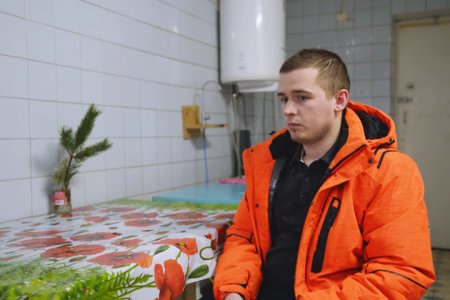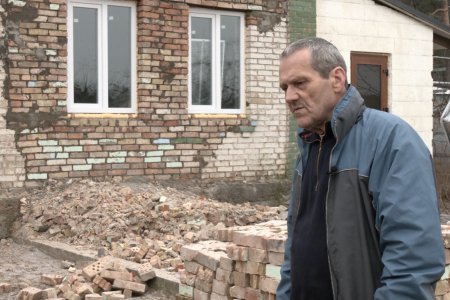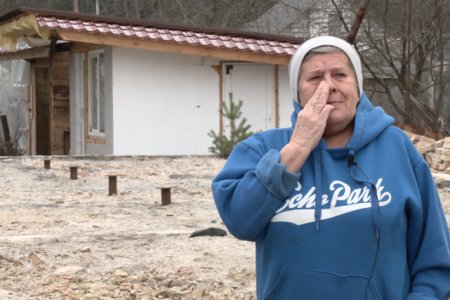I lived all my life in Severodonetsk. It is a small town in the Lugansk region with a population of about 100-130 thousand people. I had a favorite job at the Design Institute “Chemistry”. Almost 300 of us worked there. We have done projects for the whole world, including Ukraine and Russia.
How did the war of 2022 burst into your life?
The war has found me at home. First came two missiles. I was with my dog, living in a village three kilometers from the city and a kilometer from the airport. When the rockets exploded, it was an absolute horror. I rushed out and saw that they had hit the airport. I entered the house, and the dog was trembling because the place was shaking. Five minutes later, another explosion. I did not go to work: I called and asked for a vacation day. I was terrified.
How did events develop in your city?
From the first day of the war, shelling and explosions began. I remember that in 2014 it was dangerous in a private house. So I thought: “I’ll go to Severodonetsk, away from the village. I have an apartment there. Hopefully, it won’t last long.” So I took the dog and left. I was in the apartment from Thursday to Saturday, but it was loud on Saturday, and I realized it was unsafe there. I wanted to go to work; there was a good bomb shelter. But the employees’ children were there; they said they were allergic to a dog, and I didn’t go anywhere.
I was invited by our director and spent five nights in his place. The shelling was very loud. I ran to him [the director] through the forest and met our Ukrainian military. They wondered what the woman was doing with the dog in the woods. They stopped me twice; I showed my documents and said where I was going. I lived with strangers for five days and realized this was not an option. Maybe they would want to leave, or perhaps I would.
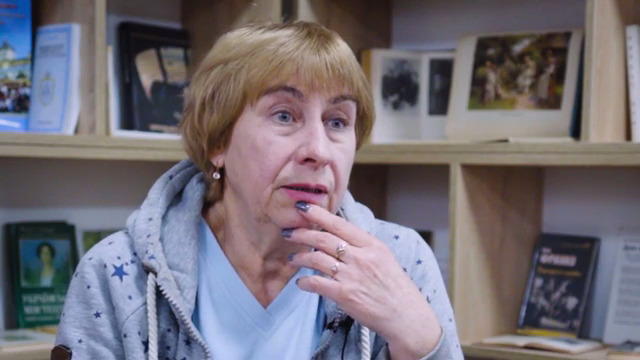
On 2 March, I returned to my apartment. There was still electricity, gas, and water. The dog and I rested, I took a shower, but suddenly a rocket hit nearby. I went outside, and there was such a colossal crater that I had never seen in my life. In the building, everyone’s windows flew out. Another reason I rushed out was because of the gas smell. A fragment of a rocket broke a gas pipe in the street. There were no windows, and gas began to fill the entrance.
We went to the school bomb shelter in our neighborhood. When I got there, there were almost 1000 people.
This is a huge school with a good bomb shelter. We were there with the dog until 9 March because, on the 8th, our school was shelled. They bombed it. The bomb shelter shuddered, but everyone survived, thank God. When the school was bombed, I decided to return to the village. It was 9 March. The snow was knee-deep, and we walked with the dog through the forest.
Why didn’t you leave the city in the first days of the war?
I signed up for the evacuation twice, but I had a sister with cancer (Nadezhda) on my hands. She didn’t want to leave. We thought everything would pass and everything would be like in 2014. The Russians will be driven out, and everything will be fine. My sister was scheduled for chemotherapy on 24 February (the first day of the war). We had no other choice except to go somewhere for treatment. We were taken by bus to Sloviansk. There we were sheltered, fed, and kept warm. But that night, a rocket hit the railroad tracks in Kramatorsk, and our train could not leave for Lozovaia. At first, we waited for a long time, and finally, we went.
The road was long. We were pulled not by an electric locomotive but by a diesel locomotive. Trains were delayed.
Then we were taken from Lozovaia to Lviv. The train traveled for 19.5 hours. We drove through fields and meadows, and planes were flying over us. It was so scary! We were driving without lights, and our phones were turned off. The road was tough because we were traveling in an old train car. I don’t understand how they managed. Thanks to the brave railroad workers! Before leaving, I looked at the building where we lived. It was destroyed: the fourth and fifth entrances burned down. It was my son’s apartment. I wanted to see mine, but the military wouldn’t let me in. They said: “You have nothing to do there; the whole area is destroyed.” People were not allowed to go there at all, and then I was informed that everything there was looted.
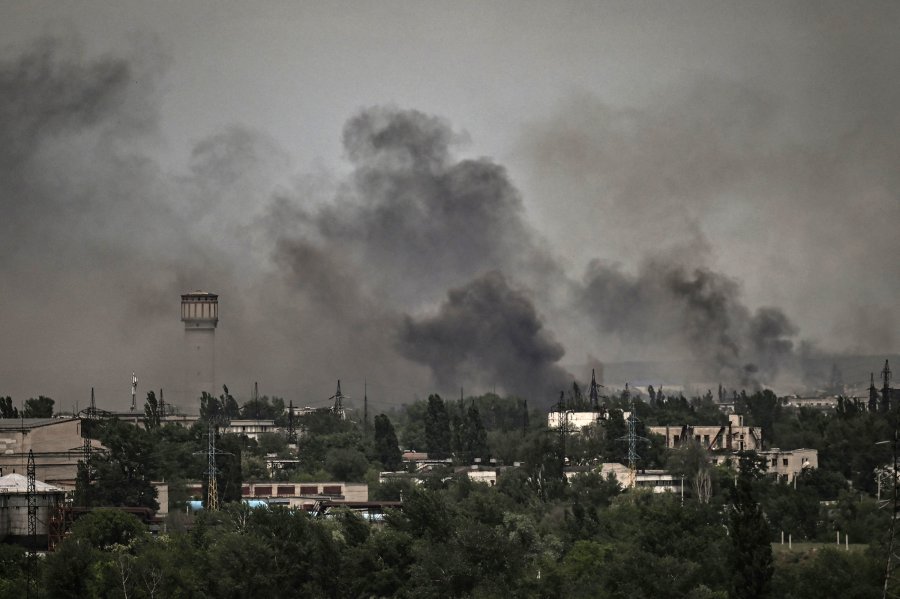
Have you witnessed the destruction of civilian facilities?
Several shells hit the apartment where we lived with the dog. In the nine-story building at the fourth entrance, the steps folded in. There was a hit in an apartment in a neighboring house, and I saw everything was destroyed there. For some reason, the owner of this apartment was lying on the street. Why? I don’t know. It seems pharmacies and shops were damaged in the first week.
The shells flew endlessly. They flew and flew. The whole city was in smoke.
Once they hit, the smoke rose in a pillar. I saw it all, including “Grads” [rockets] and rubble sticking out of the ground. We went for humanitarian aid when there was quiet. We saw “Grads” protruding, battered roofs, broken fences, and destroyed houses. We’ve all seen it.
Were there problems with food in the city?
We ran to our apartments, grabbed food, and rushed to a bomb shelter. After I left for the village, they began to bring humanitarian aid.
Have you had any problems with the dog?
I trusted her entirely because she sensed danger. Dogs hear the sound of a flying rocket before our ears do. They are very sensitive. They shake before the bombing starts, you know? Our two dogs died earlier. Nobody knows from what. They say it could have been a heart attack. When the shelling started, I calmed her down. That’s probably the only way she survived. A large number of dogs have disappeared somewhere. There were many problems along the way. There wasn’t even room for people...
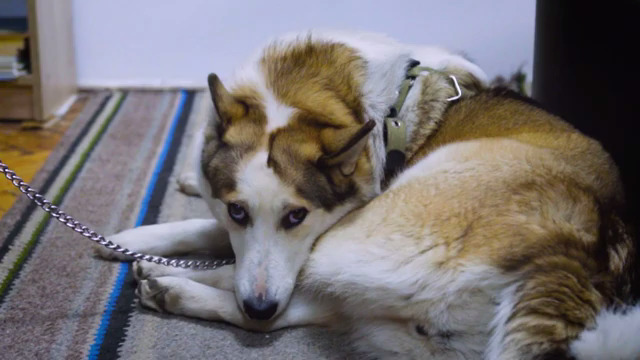
Yes, she interfered. She interfered while on the train because she could not jump on high steps. Someone wanted to go faster than us, but they couldn’t. It was a problem. Everyone swore: “Again, this woman with a dog.” I was probably the only one there but I couldn’t leave the dog. She endured over 19 hours on the train non-stop and did nothing wrong. Her eyes were red, and she looked at me and whined. I understood she wanted to go to the toilet, but I couldn’t help. Somehow we made it.
Do you know about civilian casualties?
I didn’t see it, but I heard about it. Among my relatives, there is a deceased. I came to feed the dog, and the mines flew without end. Nika (the dog) and I walked around afterward and collected the pieces. We rode a bike with her; she pulled me. I hooked the leash to the trunk, and she ran next to the front wheel. I collected half a box of shell fragments. They were sharp, and some people died from them.
Over time, we learned to distinguish between calibers. If the shell fell so that the earth trembled — this was the 125th caliber. Slightly quieter — 110th.
We already knew how tanks fire, and it was terrifying.
What do you know about the people who are now in Severodonetsk?
The head of the regional administration announced statistics on how many people are left. Not many, and it is challenging for them there. There is no electricity, no gas, and no water.
Do you plan to return home after the end of the war?
Hopefully, we’ll be back soon. I really want to go home because this is our home. I was born and raised there. But everything is so badly destroyed that I alone can not do anything. Help is needed. Destruction is one thing, but much more was plundered. The things we work for all our lives. I had everything, including a good salary. It’s hard when everything was there and then — nothing. Everything was looted. They said that so far our houses are not suitable for life. But, of course, I want, I really want to return home.

